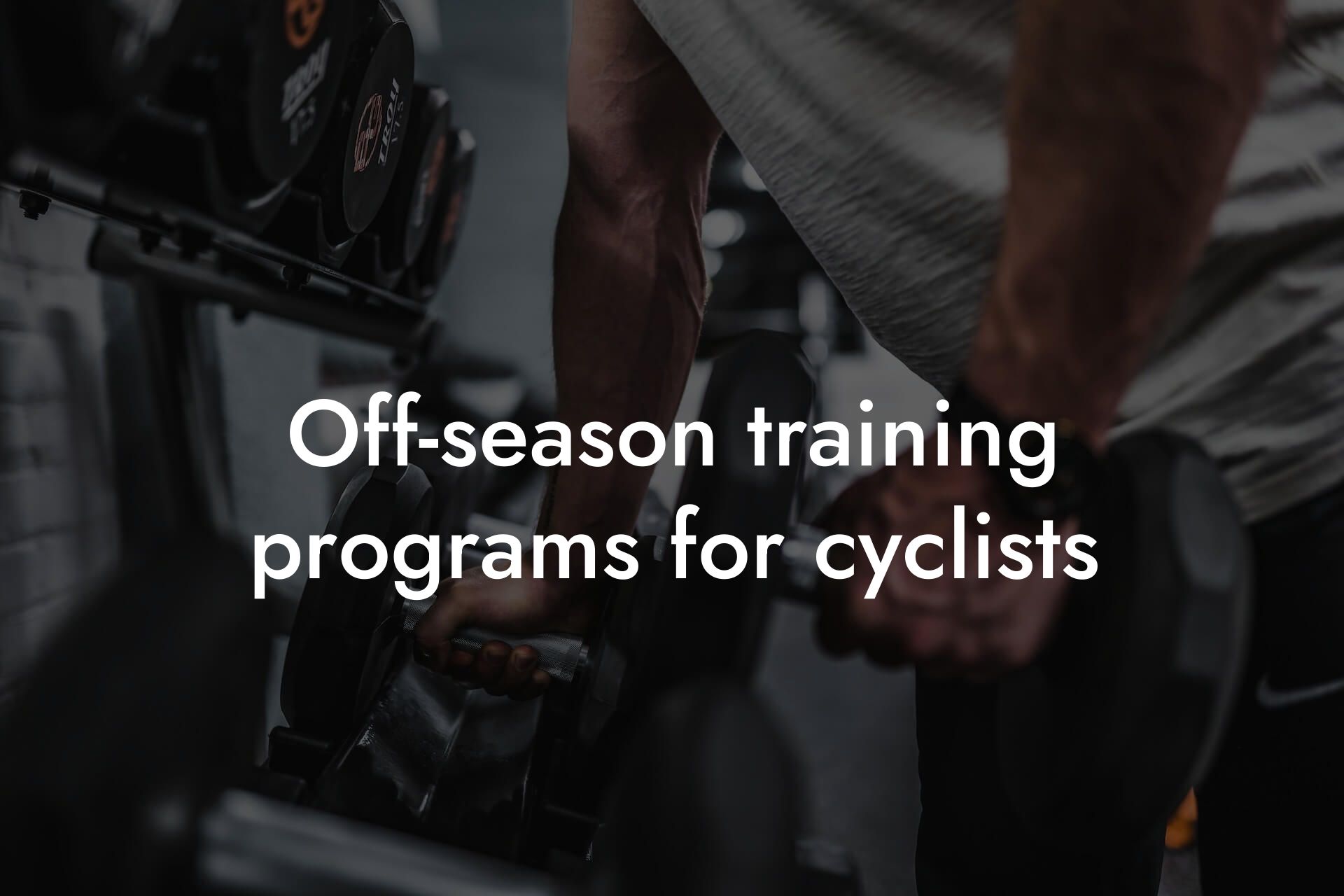Understanding the Importance of Nutrition for Endurance Cycling
As a high-earning professional, you understand the importance of optimal physical performance to excel in your career and personal life. When it comes to long cycling races, nutrition plays a critical role in determining your endurance and overall performance. A well-planned nutrition strategy can make all the difference between crossing the finish line feeling strong and energized, or struggling to complete the race due to fatigue and bonking.
Table of Contents
- Understanding the Importance of Nutrition for Endurance Cycling
- Macronutrient Balance for Endurance Cycling
- Hydration Strategies for Endurance Cycling
- Electrolyte Management for Endurance Cycling
- Carbohydrate Loading for Endurance Cycling
- Fueling During Long Cycling Races
- Post-Race Nutrition for Recovery
- Individualized Nutrition Planning for Endurance Cycling
- Frequently Asked Questions
Macronutrient Balance for Endurance Cycling
A balanced diet that provides the right mix of macronutrients is essential for endurance cycling. Carbohydrates, protein, and fat are the three primary macronutrients that provide energy for your body. For endurance cycling, a general guideline is to focus on a carbohydrate-dominated diet, with a moderate amount of protein and a small amount of fat.
Aim to consume 2-3 grams of carbohydrates per kilogram of body weight daily, with a focus on complex carbohydrates such as whole grains, fruits, and vegetables. Protein intake should be around 1.2-1.6 grams per kilogram of body weight daily, with a focus on lean protein sources like lean meats, fish, and eggs. Fat intake should be moderate, around 0.5-1 gram per kilogram of body weight daily, with a focus on healthy fats like nuts, seeds, and avocados.
Hydration Strategies for Endurance Cycling
Adequate hydration is critical for endurance cycling, as even mild dehydration can lead to decreased performance and increased risk of injury. Aim to drink at least 8-10 glasses of water per day, with a focus on electrolyte-rich drinks like sports drinks or coconut water during and after exercise.
During long cycling races, aim to drink 1-2 bottles of electrolyte-rich drink per hour, with a focus on drinks that contain sodium, potassium, and magnesium. Avoid plain water, as it can lead to hyponatremia, a potentially life-threatening condition.
Electrolyte Management for Endurance Cycling
Electrolytes like sodium, potassium, and magnesium play a critical role in maintaining proper muscle and nerve function during exercise. During long cycling races, electrolyte levels can become depleted, leading to muscle cramps, fatigue, and decreased performance.
Aim to consume electrolyte-rich drinks or snacks during exercise, with a focus on products that contain sodium, potassium, and magnesium. You can also consider taking electrolyte supplements or tablets, but always consult with a healthcare professional or registered dietitian before adding any new supplements to your diet.
Carbohydrate Loading for Endurance Cycling
Carbohydrate loading is a nutrition strategy that involves consuming a high amount of carbohydrates in the days leading up to a long cycling race. This can help to maximize muscle glycogen stores, providing a readily available source of energy during exercise.
Aim to consume 3-5 grams of carbohydrates per kilogram of body weight daily for 2-3 days leading up to the race, with a focus on complex carbohydrates like whole grains, fruits, and vegetables. You can also consider consuming a high-carbohydrate meal or snack 1-2 hours before the race, such as a bowl of oatmeal with fruit and nuts.
Fueling During Long Cycling Races
Fueling during long cycling races is critical to maintaining energy levels and preventing bonking. Aim to consume 30-60 grams of carbohydrates per hour, with a focus on easily digestible snacks like energy gels, bars, and chews.
Look for snacks that contain a mix of simple and complex carbohydrates, as well as electrolytes like sodium and potassium. Avoid snacks that are high in fiber, protein, or fat, as they can cause gastrointestinal distress during exercise.
Post-Race Nutrition for Recovery
After a long cycling race, it's essential to refuel and rehydrate to aid in recovery. Aim to consume a meal or snack that contains a mix of carbohydrates and protein within 30-60 minutes after exercise, such as a smoothie with fruit, yogurt, and protein powder.
Continue to drink electrolyte-rich drinks for several hours after exercise to replenish lost electrolytes. Aim to consume a balanced meal with a focus on complex carbohydrates, lean protein, and healthy fats within 2-3 hours after exercise.
Individualized Nutrition Planning for Endurance Cycling
Every athlete is unique, and what works for one person may not work for another. That's why individualized nutrition planning is critical for endurance cycling. Consider working with a registered dietitian or healthcare professional to develop a personalized nutrition plan that takes into account your specific needs and goals.
At Tano Performance Group, we use advanced body composition analysis tools like DEXA scanning to provide a comprehensive picture of your body composition and nutritional needs. Our team of experts can help you develop a personalized nutrition plan that optimizes your performance and helps you achieve your goals.
Frequently Asked Questions
What are the most important nutrients for endurance during long cycling races?
When it comes to endurance during long cycling races, carbohydrates, protein, and healthy fats are the three macronutrients that play a crucial role. Carbohydrates provide energy, protein helps with muscle repair and recovery, and healthy fats support energy production and reduce inflammation. Additionally, adequate hydration and electrolyte balance are also essential for optimal performance.
How much carbohydrate intake is recommended for long cycling races?
The recommended daily carbohydrate intake for endurance athletes is 2-3 grams per kilogram of body weight. For example, a 70kg athlete would require 140-210 grams of carbohydrates per day. During long cycling races, aim to consume 30-60 grams of carbohydrates per hour to maintain energy levels.
What are some examples of carbohydrate-rich foods for cycling?
Examples of carbohydrate-rich foods that are great for cycling include brown rice, whole wheat bread, quinoa, oats, fruits, and vegetables. Additionally, sports-specific products like energy gels, bars, and chews can provide a quick source of carbohydrates during long rides.
How much protein do I need for muscle recovery during long cycling races?
Aim to consume 15-20 grams of protein within 30-60 minutes after your ride to support muscle recovery. This can come from sources like protein shakes, bars, or whole foods like lean meats, fish, eggs, dairy, and legumes.
What is the role of healthy fats in endurance cycling?
Healthy fats, particularly omega-3 fatty acids, help reduce inflammation and support energy production during long cycling races. Include sources like nuts, seeds, avocados, and fatty fish in your diet to support your endurance performance.
How much water should I drink during long cycling races?
Aim to drink at least 500-750ml of water per hour during long cycling races to stay hydrated. Monitor your urine output and color to ensure you're drinking enough – if your urine is dark yellow or you're not urinating frequently enough, it may be a sign of dehydration.
What are electrolytes, and why are they important for cycling?
Electrolytes are minerals like sodium, potassium, and magnesium that help regulate fluid balance and nerve function in the body. During long cycling races, electrolytes are lost through sweat, which can lead to muscle cramps, fatigue, and decreased performance. Include electrolyte-rich foods or supplements in your diet to maintain optimal levels.
How can I prevent dehydration during long cycling races?
To prevent dehydration, drink water or electrolyte-rich fluids regularly during your ride, especially in hot and humid conditions. Monitor your body's signs of dehydration, such as dark urine, dizziness, or headaches, and adjust your hydration strategy accordingly.
What are some common signs of dehydration during cycling?
Common signs of dehydration during cycling include dark urine, dizziness, lightheadedness, headaches, muscle cramps, and decreased performance. If you experience any of these symptoms, stop and rehydrate as soon as possible.
Can I eat during long cycling races?
Yes, eating during long cycling races can help maintain energy levels and prevent bonking. Opt for easy-to-digest foods like energy bars, gels, or bananas, and avoid heavy or greasy foods that can cause digestive discomfort.
How often should I eat during long cycling races?
Aim to eat every 30-60 minutes during long cycling races to maintain energy levels. This can be in the form of snacks or meals, depending on the duration and intensity of your ride.
What are some examples of healthy snacks for cycling?
Examples of healthy snacks for cycling include energy bars, nuts, seeds, dried fruits, and sandwiches. Look for snacks that are high in carbohydrates, moderate in protein, and low in fat and fiber to minimize digestive discomfort.
How can I prevent gastrointestinal distress during long cycling races?
To prevent gastrointestinal distress during long cycling races, avoid eating heavy or greasy foods, and opt for easy-to-digest snacks instead. Additionally, stay hydrated, and avoid caffeine and carbonated drinks that can irritate the stomach.
What is the role of caffeine in endurance cycling?
Caffeine can help increase alertness and endurance during long cycling races. However, be cautious not to overconsume, as high doses can lead to gastrointestinal distress, anxiety, and dehydration. Aim for a moderate dose of 100-200mg per hour, equivalent to 1-2 cups of coffee.
How can I optimize my nutrition plan for long cycling races?
To optimize your nutrition plan for long cycling races, experiment with different foods and hydration strategies during training to find what works best for you. Additionally, consult with a sports dietitian or coach to develop a personalized nutrition plan tailored to your needs and goals.
What are some common nutrition mistakes to avoid during long cycling races?
Common nutrition mistakes to avoid during long cycling races include inadequate hydration, insufficient carbohydrate intake, and consuming heavy or greasy foods. Additionally, avoid trying new foods or hydration strategies during competition, and stick to what works best for you.
How can I recover nutritionally after long cycling races?
To recover nutritionally after long cycling races, consume a balanced meal or snack with carbohydrates and protein within 30-60 minutes after your ride. Additionally, stay hydrated, and include anti-inflammatory foods like omega-3 rich fish and antioxidants in your diet to support recovery.
What is the importance of post-ride nutrition for recovery?
Post-ride nutrition plays a critical role in recovery by replenishing energy stores, repairing muscle damage, and reducing inflammation. Adequate nutrition after long cycling races can help improve recovery, reduce muscle soreness, and prepare your body for the next ride.
Can I use nutrition supplements during long cycling races?
Yes, nutrition supplements like energy gels, bars, and chews can be helpful during long cycling races. However, always consult with a healthcare professional or sports dietitian before adding new supplements to your regimen, and ensure they are safe and effective for your body.
How can I stay motivated to fuel my body for long cycling races?
To stay motivated to fuel your body for long cycling races, set specific nutrition goals, track your progress, and celebrate small victories along the way. Additionally, remind yourself of the importance of proper nutrition for optimal performance and recovery.
What are some common myths about nutrition for endurance cycling?
Common myths about nutrition for endurance cycling include the idea that you need to "carb-load" before a ride, or that you can't eat during exercise. Debunk these myths by staying informed and consulting with a sports dietitian or coach to develop a personalized nutrition plan.
How can I get personalized nutrition advice for my long cycling races?
To get personalized nutrition advice for your long cycling races, consult with a sports dietitian or coach who can help you develop a tailored nutrition plan based on your individual needs, goals, and body composition.
Here are some related articles you might love...
- Off-season training programs for cyclists
- Bone density and injury prevention for cyclists
- Using DEXA scans to monitor cyclist health and performance
- Recovery strategies for cyclists after intense races
- Strength training for cyclists to improve power output
- The importance of body composition in cycling performance
- Reducing body fat for better power-to-weight ratio in cycling
- The role of muscle mass in cycling endurance
- Hydration and nutrition for optimal cycling performance
Zak Faulkner
Zak Faulkner is a leading authority in the realm of physical health and body composition analysis, with over 15 years of experience helping professionals optimise their fitness and well-being. As one the experts behind Tano Performance Group, Zak has dedicated his career to providing in-depth, science-backed insights that empower clients to elevate their physical performance and overall health.
With extensive knowledge of DEXA technology, Zak specializes in delivering comprehensive body assessments that offer precise data on body fat, muscle mass, bone density, and overall physique. His expertise enables individuals to make informed decisions and achieve their fitness goals with accuracy and confidence. Zak’s approach is rooted in a deep understanding of human physiology, combined with a passion for helping clients unlock their full potential through personalised strategies.
Over the years, Zak has earned a reputation for his commitment to excellence, precision, and client-focused service. His guidance is trusted by top professionals who demand the best when it comes to their health. Whether advising on fitness programs, nutritional strategies, or long-term wellness plans, Zak Faulkner’s insights are a valuable resource for anyone serious about taking their health and fitness to the next level.
At Tano Performance Group, Zak continues to lead our Content Team revolutionising how professionals approach their physical health, offering unparalleled expertise that drives real results.




